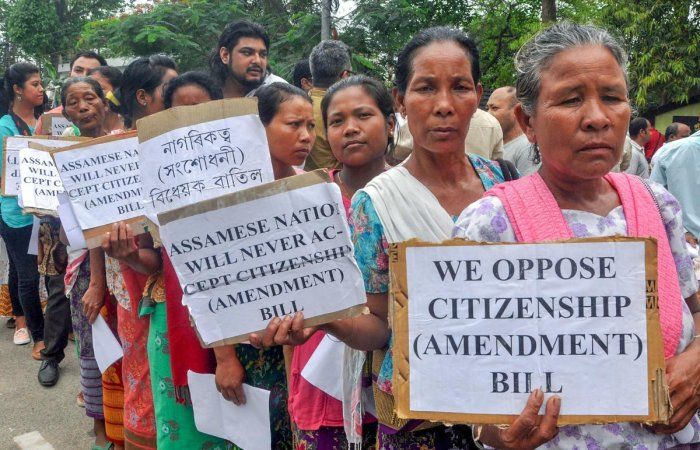Citizenship (Amendment) Bill Cleared By Modi Cabinet
 NEW DELHI : The Citizenship (Amendment) Bill or CAB, which seeks to make it easier for non-Muslim refugees from Pakistan, Bangladesh and Afghanistan to become citizens of India, has been cleared by the cabinet for tabling in parliament.
NEW DELHI : The Citizenship (Amendment) Bill or CAB, which seeks to make it easier for non-Muslim refugees from Pakistan, Bangladesh and Afghanistan to become citizens of India, has been cleared by the cabinet for tabling in parliament.
“It has been given clearance and will be discussed once it is tabled in Parliament,” Union minister Prakash Javadekar said in the Cabinet briefing. The Cabinet approval was crucial as the ruling Bharatiya Janata Party has been strongly advocating a nationwide National Register of Citizens (NRC) exercise before the 2024 Lok Sabha polls.
The Opposition has staunchly opposed both the Bill and the country-wide NRC.The bill was passed by the Lok Sabha in January but lapsed without being cleared in Rajya Sabha.
The Citizenship (Amendment) Bill aims at granting Indian citizenship to people from six communities – Hindus, Christians, Sikhs, Jains, Buddhists and Parsis — who had migrated to India without valid travel documents or whose documents have expired. The bill amends a 1955 law to grant exemptions to illegal migrants from these six communities, who reached on or before December 2014.
The opposition alleges that the bill targets Muslims and is at odds with the secular principles enshrined in the constitution as it excludes a community. According to critics, the move is a violation of Article 14 which guarantees the right to equality.
The Citizenship Act 1955 says those seeking citizenship must have lived in India in the 12 months before their application and for 11 years of the previous 14 years. The amendment seeks to relax the second requirement from 11 to six years for non-Muslim applicants from the three neighbouring countries.
Reports suggest other revisions to clearly differentiate in the new bill between those who are the “illegal immigrants” and those who took shelter in India after facing religious persecution in the neighbouring countries.
There have been protests against the move in northeastern states, which are concerned about citizenship to a large number of Hindus who have crossed over from Bangladesh over the decades. BJP’s Assam ally Asom Gana Parishad (AGP) had earlier opposed the bill when it was cleared by the Lok Sabha in 2016 and even pulled out of the ruling coalition in protest. When the bill lapsed, the AGP returned.
The bill is set to clear Lok Sabha easily but in Rajya Sabha, where the government is in a minority, the numbers are more challenging. The Congress, Trinamool, DMK, Samajwadi Party,Left and Rashtriya Janata Dal have opposed the bill. But parties like AIADMK may tip the balance.
On October 1, Home Minister Amit Shah had said in parliament: “NRC has no such provision which says that certain religions will be excluded from it. All citizens of India irrespective of religion will figure in the NRC list. The NRC is different from Citizenship Amendment Bill.”
Defending the citizenship move, Rajnath Singh said yesterday that the three neighbouring countries were essentially Islamic nations and so it is non-Muslims and not Muslims who are at the receiving end of religious persecution there.
“Minorities in the neighbouring theocratic countries have been subjected to continuous persecution, which forced them to seek asylum in India. Giving citizenship to six minorities is in the spirit of Sarva Dharma Sambhav,” Mr Singh said.
Meanwhile, Arunachal Pradesh, Nagaland and Mizoram, where Inner Line Permit (ILP) regime is applicable, will be kept out of the purview of the proposed Citizenship Amendment Bill (CAB), which is expected to be introduced in the ongoing Winter Session of the Parliament on 9 December.
The bill seeks to amend the Citizenship Act, 1955, in order to grant Indian nationality to Hindus, Sikhs, Buddhists, Jains, Parsis and Christians who come to India due to religious persecution in Bangladesh, Pakistan and Afghanistan even if they don’t possess proper documents.
The information comes amidst widespread criticism of the draft law from the northeastern states, which are sceptical about the protection of rights of their indigenous population, once the new law recognises Hindu Bengalis and other migrants as citizens of India.
Apart from this, Opposition parties in the rest of India have been against the policy claiming that it is not only unconstitutional to grant citizenship on a religious basis, but is also discriminatory against Muslims.
Opposition parties are once again likely to push for the Bill to be referred to a select committee before it is discussed in the Upper House.
(With Agency Inputs ).

